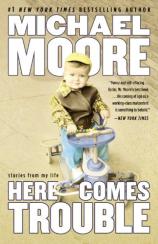Here Comes Trouble: Stories from My Life
Review
Here Comes Trouble: Stories from My Life
When a public figure who is as polarizing as Michael Moore writes a book, it’s inevitable that readers’ opinions will split cleanly along the love/hate divide. But even Michael Moore detractors reading this review should suspend judgment and give this collection of tales of the first half of his life growing up in the middle of Middle America a fair look, because they may find they have more in common with Moore’s values than they might think.
"HERE COMES TROUBLE is written in the brash, breezy style that has made Moore such a popular guest on the talk show circuit."
Born in 1954 in Davison, Michigan (his ancestors had migrated to the area from New York in the 1830s), a small town on the outskirts of the gritty industrial city of Flint, Moore was the son of a father who worked at the AC Spark Plug factory and a stay-at-home mother. As predictable and comforting as it would be to discover he was raised by political radicals, his parents were conventional Democrats. He was an indifferent student, but serious enough about entering the priesthood that he enrolled in a seminary at age 14. The account of his year there, featuring a mock exorcism and capped by an invitation not to return because he asked too many questions (“You mean like why does this institution hate women and not let them be priests?”) showcases Moore’s wit and ability to make himself the butt of a good joke.
But for all its humor, this book might have been better subtitled “The Education of an American Radical.” There’s nothing theoretical about Moore’s politics; instead, they seem to have evolved out of many of the incidents chronicled in this book. As he encountered instances of racial prejudice (there’s a chilling chapter on his experience at a gathering of Michigan white supremacist hate groups and on his prizewinning speech as a teenager denouncing the Elks Club’s exclusionary membership practices) or corporate greed (“Few foresaw how the taking of just one itsy-bitsy little thread and pulling it out of the middle-class fabric would soon unravel the entire tapestry, leaving everyone struggling in a dog-eat-dog existence, a weekly battle to keep one’s head simply above water.”), Moore developed practical, if sometimes unconventional, responses. He even reveals for the first time that he backed Richard Nixon in 1968 because he thought the Republican was the “peace candidate,” only to learn how quickly those hopes were betrayed (he still offers a poignant account of Nixon’s final campaign appearance on behalf of a Republican congressional candidate in Bad Axe, Michigan in 1974).
Moore writes of the abuse suffered by an elementary school friend who was gay at a time less tolerant than our own and of his high school friend who nearly died from a botched illegal abortion. Spurred by his desire to remove the principal and his assistant responsible for administering discipline, Moore took a fling at conventional politics when he was elected to the Davison school board at age 18. In the middle of his term, he was the subject of a recall election he handily defeated. Moore was the founder of the alternative paper the Flint (later Michigan) Voice, a position that led to a confrontation over press freedom.
HERE COMES TROUBLE is written in the brash, breezy style that has made Moore such a popular guest on the talk show circuit. There are moments of high comedy, as in the account of the time he drove the “getaway car” as he and his high school friends took a dry run for their escape into Canada in case they had to flee to avoid the draft. “Canada would take us in if need be,” he concluded, "even if we had to endure their Canadian sense of humour.” Moore confesses in “A Note from the Author” that “Many of the names and circumstances have been changed to protect the innocent, and sometimes the guilty.” That’s why one can be forgiven for believing there’s just a bit of the tall tale in stories like “The Canoe,” a vivid account of his great-great grandfather’s friendly encounters with the Chippewa Indians of central Michigan, or in his story of being at Bitburg, Germany with a friend, the son of Holocaust survivors, during President Reagan’s visit in 1985.
Moore’s memoir ends with the premiere of his first documentary, Roger & Me, in 1989. No doubt someday there will be a second volume that traces the arc of his career as a filmmaker and activist, and the actions he claims have earned him the title of the “most hated man in America.” Let’s hope it’s written with the same verve, if not the innocent charm, of this book.
Reviewed by Harvey Freedenberg on October 6, 2011
Here Comes Trouble: Stories from My Life
- Publication Date: September 18, 2012
- Paperback: 448 pages
- Publisher: Grand Central Publishing
- ISBN-10: 1455513075
- ISBN-13: 9781455513079





